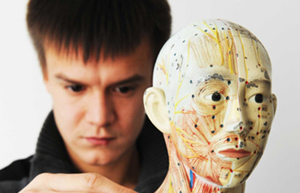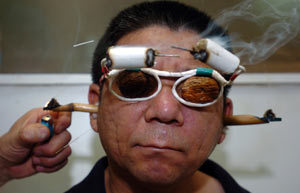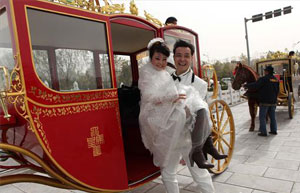US mid-term elections not to affect China policy
Updated: 2010-11-09 15
(Xinhua)
BEIJING - Despite the shifting political patterns in the US Senate and House of Representatives following the mid-term elections, experts on China-US relations believe there won't be many changes made to the country's China policy.
With Republicans winning back their control of the House and making inroads to the Senate, the blame game during the election campaigns seems to have finally died down.
"All these ads are misleading in portraying China. And their main targets are not China, but the different political parties and the economy", Ting Wang, economic and legal coordinator with the New York-based National Committee of US-China Relations, said Tuesday in a telephone interview with Xinhua.
Wang said over the last ten years, Republicans have generally been pro business and pro defense, and the pro-business side has controlled the pro-defense side on China policy.
As both Republicans and Democrats look to the 2012 general elections, the most China-related issues in the US over the coming years look set to be related to economy.
"It's hard to say now because some of the new Republicans are tea party Republicans that are popular conservatives," he said. "They are fairly new to Washington and they haven't said much about their position on trade issues."
Because the two economies are closely linked, Wang predicted that economic relations between the two sides would remain "fairly stable."
When Democrats ran the House, they passed a bill calling for countervailing duties against Chinese imports, if China maintained its currency exchange rate control vis-a-vis US dollars. The Senate, nonetheless, did not pass the bill.
"As Republicans take over the House, it's less likely for them to pass the same bill again as they tend to be pro free trade," he added.
Jin Canrong, a Beijing-based Renmin University professor at international studies, said the mid-term election results were only a "decisive variable" in the complexity of China-US relations, and that the general framework would not be seriously affected.
Prof Jin said, "If the job situation (in the US) is not improved, there will be tension both within the Obama Administration as well as outside, as the US looks to out-source its political responsibility , especially to China."
In his view, issues of dispute, such as currency, intellectual property rights and the entry to the Chinese market will not disappear.
After the mid-term elections, the G20 summit will be the first chance that US President Barack Obama meets Chinese President Hu Jintao.
Although business groups are already urging G20 leaders to ensure rare earth supply from China, since the Chinese government initiated its quota control on rare earth exports on the grounds of environmental protection, Dr Yu Wanli, who studies international politics at Peking University, said he didn't see it happening.
"I think currency and trade issues might be downplayed at the summit," he said.
Some Western commentators accused China of aspiring to be a global power while being reluctant to shoulder its due responsibilities, citing topics like rare earth, or climate change.
Prof Jin came to China's defence, saying China is determined to be a responsible power in the world. "But the Chinese government will be responsible for its own people first."
"It should learn from the West and the United States to protect its own national interests," he said.
One basic fact on rare earth, said Dr Yu, was that China's reserve of rare earth only accounts for 34 percent of the world's total, while China's production makes up 97 percent of the global output.
"That's not sustainable," he said. "One thing we've learnt from the west is sustainable development."
Paper's Digest

China bags Asiad team tennis title after 24 yrs
Wimbledon semifinalist Li Na led host China to capture the team tennis title on Tuesday at the Asian Games, accomplishing her Asiad tour with three consecutive victories.
China rate rises no panacea to curb inflation: PBOC adviser
Specials

Russian possessed with TCM
Born into a family of doctors, Maxime became interested in Traditional Chinese Medicine (TCM) at the age of 12, after hearing about TCM theories such as health preservation and recuperation.

Acupuncture takes stab at UNESCO list
Acupuncture and Peking Opera have been selected as candidates for UNESCO intangible cultural heritage status.

The wedding coach comes back to life
A groom carries his bride from a wedding coach in Xuchang, Henan province, Nov 11, 2010. Produced a local factory, various original hand-made wedding carriages were displayed on the streets, attracting young people chasing fashion and an environment-friendly lifestyle.




